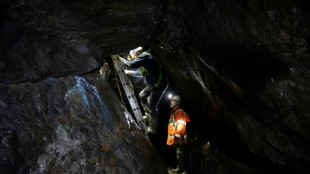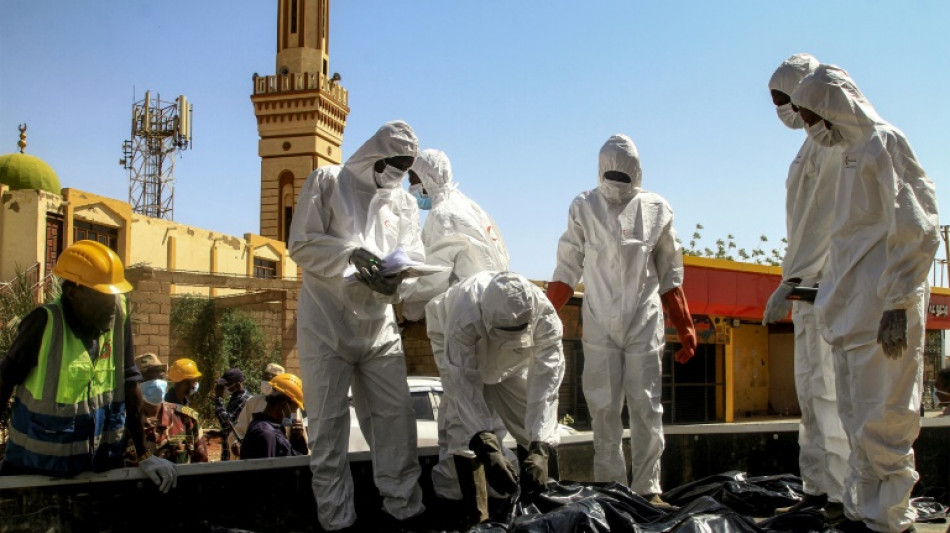
-
 Zuckerberg denies Meta bought rivals to conquer them
Zuckerberg denies Meta bought rivals to conquer them
-
Starc stars as Delhi beat Rajasthan in Super Over

-
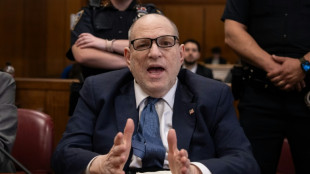 Weinstein asks to sleep in hospital, citing prison 'mistreatment'
Weinstein asks to sleep in hospital, citing prison 'mistreatment'
-
Amorim asks McIlroy to bring Masters magic to Man Utd

-
 Ruud keeps Barcelona Open defence on course
Ruud keeps Barcelona Open defence on course
-
Trump tariffs could put US Fed in a bind, Powell warns

-
 CONCACAF chief rejects 64-team World Cup plan for 2030
CONCACAF chief rejects 64-team World Cup plan for 2030
-
Putin praises Musk, compares him to Soviet space hero
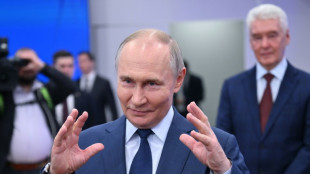
-
 Son to miss Spurs' Europa League trip to Frankfurt
Son to miss Spurs' Europa League trip to Frankfurt
-
US senator in El Salvador seeking release of wrongly deported migrant

-
 Trump tariffs could put the US Fed in a bind, Powell warns
Trump tariffs could put the US Fed in a bind, Powell warns
-
US judge says 'probable cause' to hold Trump admin in contempt

-
 India opposition slams graft charges against Gandhis
India opposition slams graft charges against Gandhis
-
Nate Bargatze to host Emmys: organizers

-
 US Fed Chair warns of 'tension' between employment, inflation goals
US Fed Chair warns of 'tension' between employment, inflation goals
-
Trump touts trade talks, China calls out tariff 'blackmail'

-
 US judge says 'probable cause' to hold govt in contempt over deportations
US judge says 'probable cause' to hold govt in contempt over deportations
-
US eliminates unit countering foreign disinformation

-
 Germany sees 'worrying' record dry spell in early 2025
Germany sees 'worrying' record dry spell in early 2025
-
Israel says 30 percent of Gaza turned into buffer zone

-
 TikTok tests letting users add informative 'Footnotes'
TikTok tests letting users add informative 'Footnotes'
-
Global uncertainty will 'certainly' hit growth: World Bank president

-
 EU lists seven 'safe' countries of origin, tightening asylum rules
EU lists seven 'safe' countries of origin, tightening asylum rules
-
Chelsea fans must 'trust' the process despite blip, says Maresca

-
 Rebel rival government in Sudan 'not the answer': UK
Rebel rival government in Sudan 'not the answer': UK
-
Prague zoo breeds near-extinct Brazilian mergansers

-
 Macron to meet Rubio, Witkoff amid transatlantic tensions
Macron to meet Rubio, Witkoff amid transatlantic tensions
-
WTO chief says 'very concerned' as tariffs cut into global trade

-
 Sports bodies have 'no excuses' on trans rules after court ruling: campaigners
Sports bodies have 'no excuses' on trans rules after court ruling: campaigners
-
Zverev joins Shelton in Munich ATP quarters

-
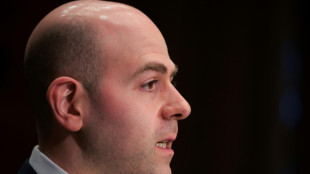 The Trump adviser who wants to rewrite the global financial system
The Trump adviser who wants to rewrite the global financial system
-
US senator travels to El Salvador over wrongly deported migrant

-
 UN watchdog chief says Iran 'not far' from nuclear bomb
UN watchdog chief says Iran 'not far' from nuclear bomb
-
Trump says 'joke' Harvard should be stripped of funds

-
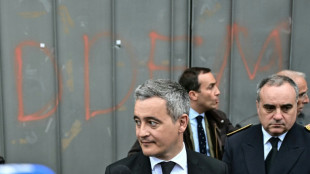 Macron vows punishment for French prison attackers
Macron vows punishment for French prison attackers
-
Canada central bank holds interest rate steady amid tariffs chaos
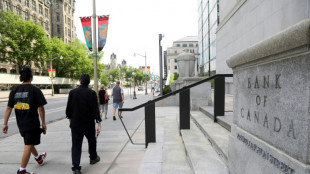
-
 Rubio headed to Paris for Ukraine war talks
Rubio headed to Paris for Ukraine war talks
-
Australian PM vows not to bow to Trump on national interest
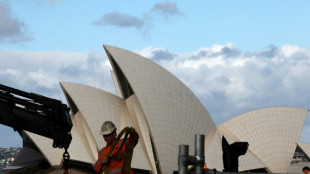
-
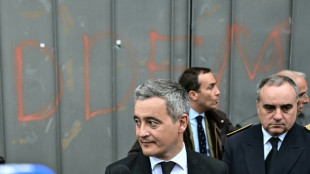 New attacks target France prison guard cars, home
New attacks target France prison guard cars, home
-
Global trade uncertainty could have 'severe negative consequences': WTO chief
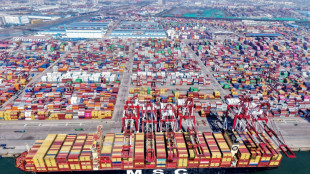
-
 Google facing £5 bn UK lawsuit over ad searches: firms
Google facing £5 bn UK lawsuit over ad searches: firms
-
Onana to return in goal for Man Utd against Lyon: Amorim

-
 Tiktok bans user behind Gisele Pelicot 'starter kit' meme
Tiktok bans user behind Gisele Pelicot 'starter kit' meme
-
'Put it on': Dutch drive for bike helmets

-
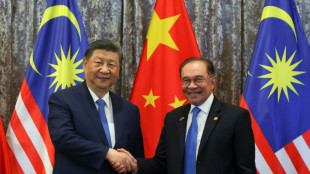 China's Xi meets Malaysian leaders, vows to 'safeguard' Asia allies
China's Xi meets Malaysian leaders, vows to 'safeguard' Asia allies
-
France urges release of jailed Russian journalists who covered Navalny

-
 Gabon striker Boupendza dies after 11th floor fall
Gabon striker Boupendza dies after 11th floor fall
-
UK top court rules definition of 'woman' based on sex at birth

-
 PSG keep Champions League bid alive, despite old ghosts reappearing
PSG keep Champions League bid alive, despite old ghosts reappearing
-
Stocks retreat as US hits Nvidia chip export to China
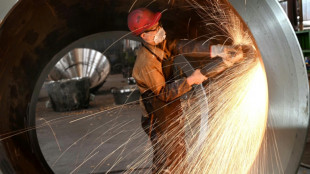

Stench of death as Sudan army, paramilitaries battle for capital
In a war-ravaged neighbourhood of Sudan's capital Khartoum, the stench from a gaping sewage pit is unbearable as Red Crescent workers pull a bloated body from deep underground.
The volunteers say 14 more remain below.
"They were shot in the head, some have crushed skulls," Hisham Zein al-Abdeen, head of forensic medicine at Sudan's health ministry, told AFP at the scene.
The victims, he said, were either shot or beaten to death before being thrown in.
Behind him, a truck idles, its flatbed already filling with bodies retrieved from the sewer well in East Nile, an eastern district of Khartoum now reduced to ruins.
Nearly two years of war between the army and the paramilitary Rapid Support Forces (RSF) have left large swathes of the capital unrecognisable.
Once a bustling metropolis, Khartoum has seen well over 3.5 million of its people flee since the war began, according to the United Nations.
Millions more, unable or unwilling to leave, live among abandoned buildings, wrecked vehicles and what the army says are hidden mass graves.
- A city destroyed -
Since April 2023, the conflict has pitted army chief Abdel Fattah al-Burhan against his former deputy and RSF commander Mohamed Hamdan Daglo.
The war has left tens of thousands dead and uprooted more than 12 million, according to UN figures, with many living in makeshift camps and over 3.5 million fleeing across borders.
The RSF initially seized the streets of Khartoum, but in recent months, the army has clawed back territory, regaining control of Bahri -- also known as Khartoum North -- and East Nile to its east.
Now, less than a kilometre separates army units in central Khartoum from the presidential palace, overtaken by RSF troops at the start of the war.
Despite these advances, Daglo remains defiant, vowing that his forces will not withdraw from the capital.
"We will not leave the Republican Palace," Daglo said in a video address shared on Telegram.
"We are coming for Port Sudan," he added, referring to the de facto capital on the Red Sea, where the government has been based since Khartoum fell.
An AFP team, travelling under military escort, crossed from Khartoum's twin city of Omdurman -- recaptured by the army last year -- into Bahri and its war-ravaged outskirts.
The convoy passed through eerie, abandoned neighbourhoods including Al-Haj Yousif, where the skeletal remains of shuttered shops and crumbling pavements stretch along the streets.
Rubble, debris and discarded tires litter the roads.
Every few blocks, small clusters of people sit outside empty buildings and stores pockmarked with bullet holes.
Hospitals and schools no longer function. The army says it has uncovered multiple mass graves, including one at the Omdurman courthouse.
The civilians still in the city appear visibly shaken by the trauma of war.
"At night, I used to hear gunshots. Then, I saw them carrying bodies and throwing them in the well," said Salha Shams El-Din, who lives near the pit where she said RSF troops dumped bodies.
- Starvation -
For those who survived to see the army recapture the district early this month, life remains a constant struggle.
There is no electricity, and clean water and food are scarce.
On a quiet street in Bahri, some 40 women sit beneath a makeshift tent, preparing Ramadan meals at a community kitchen, one of many that struggled under RSF control.
They stir large pots of aseeda -- a thick porridge made from cornflour -- and lentils over open flames, using firewood.
Gas is no longer available. Water trucks now come from Omdurman, an improvement from when residents had to risk sniper fire just to reach the Nile River, itself a health risk with no sanitation.
The soup kitchens have become civilians' last line of defence against mass starvation, according to the UN. But throughout the war, they have struggled to stay afloat.
With roads cut off, markets devastated and RSF fighters robbing volunteers at gunpoint, feeding those in need was nearly impossible.
"When the RSF was here, we couldn't get money in. Any money we'd receive, they would take," said Mouayad al-Haj, a volunteer at the community kitchen in Bahri.
"Now things are different, phone networks are back and we can at least go to Omdurman every two weeks to buy supplies," he told AFP.
What began as a power struggle between Burhan and Daglo has spiralled into the world's largest displacement and hunger crisis.
The conflict has decimated Sudan's infrastructure, crumbled an already weak economy and pushed millions to the brink of mass starvation.
Famine has been declared in three displacement camps, according to the UN-backed Inegrated Food Security Phase Classification.
In Khartoum alone, at least 100,000 people are suffering famine conditions, the IPC found.
P.Keller--VB

